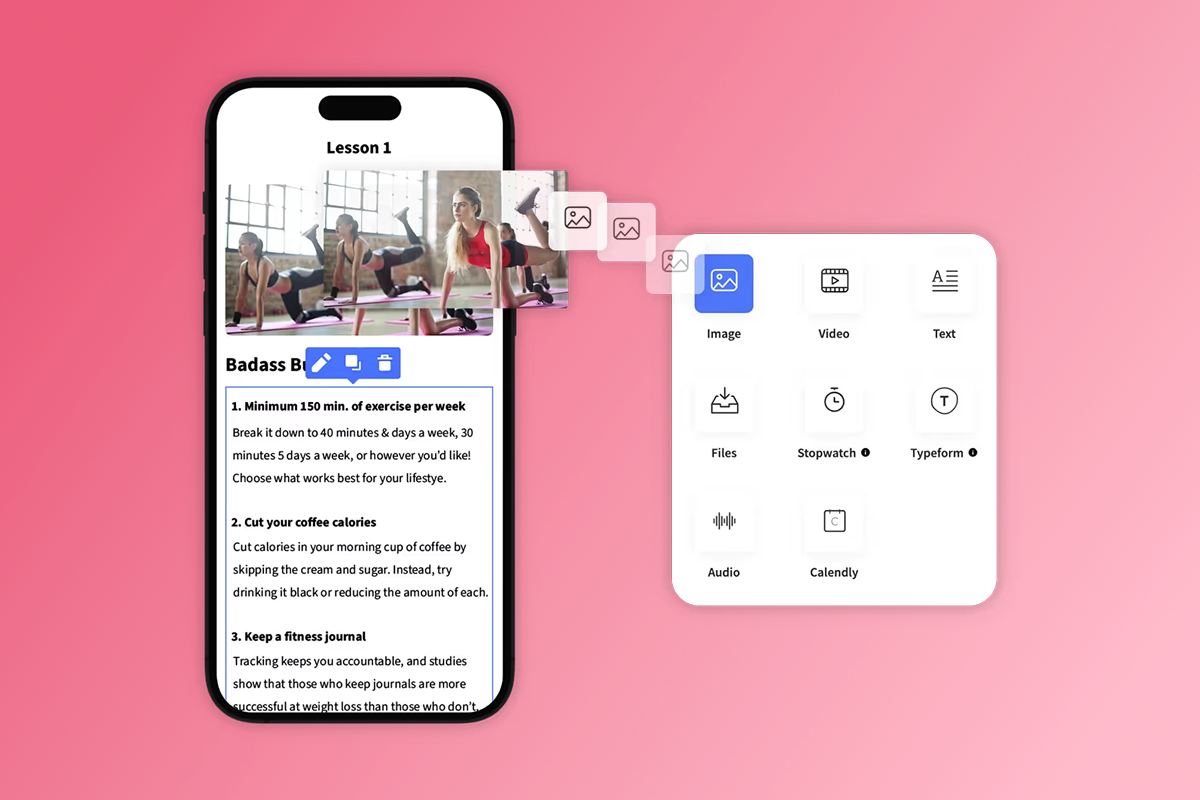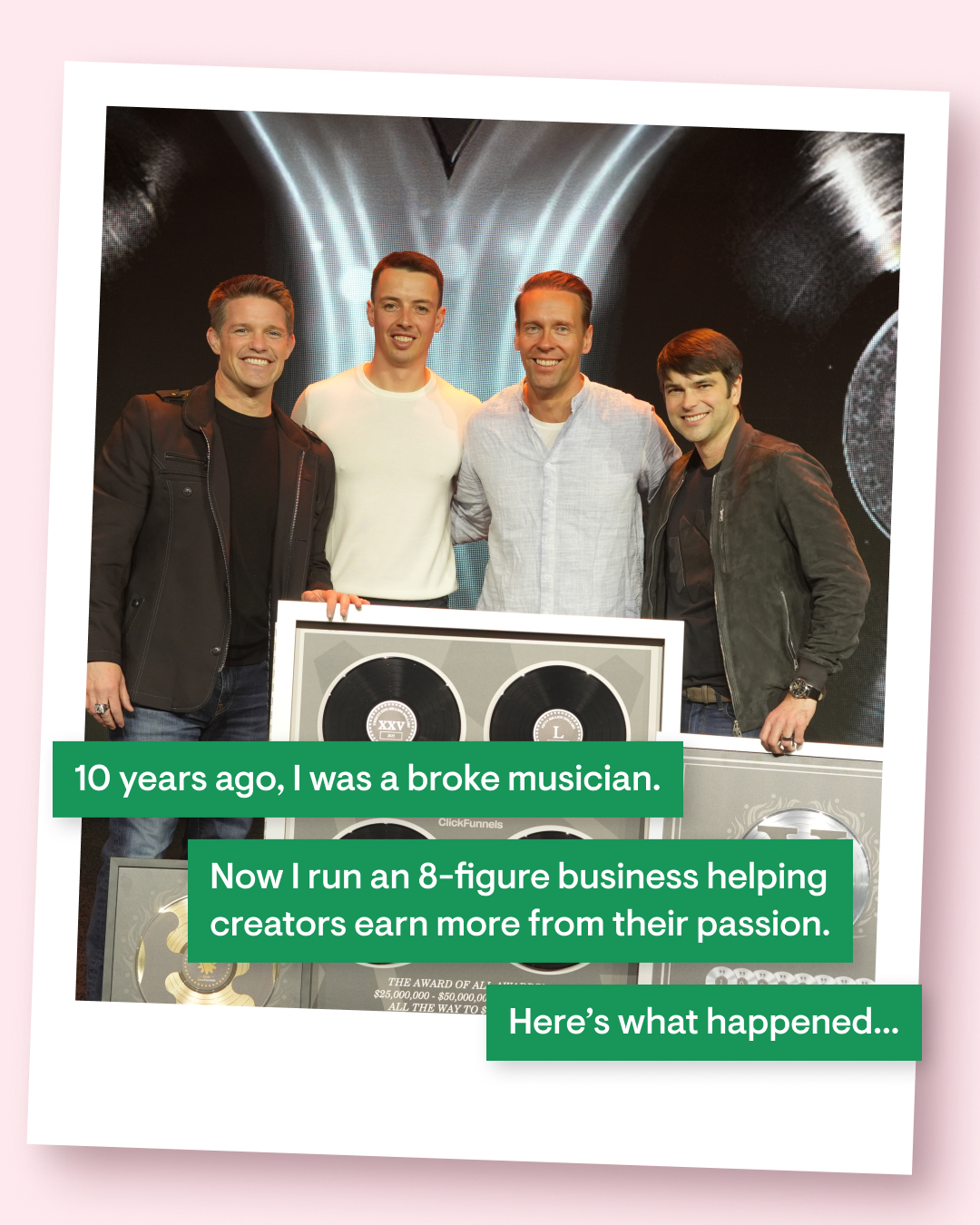Updated 18th November, 2025
Skool and Patreon promise solutions, but do they give you full ownership of your audience, a premium mobile-first experience, and the tools to turn engagement into recurring revenue without platform risk? This guide compares Skool and Patreon across community, course hosting, monetization, and mobile engagement. Then we introduce Passion as an alternative that lets you launch your own branded mobile and web app, consolidate tools, and own the relationship with your members.
Why creators look beyond Skool and Patreon
The "rented land" problem
When you build on social platforms and membership marketplaces, you hand control of your reach to algorithm changes and policy shifts that can throttle visibility overnight. Creators increasingly seek alternatives where they own customer data, access, and revenue streams directly.
Engagement gaps on mobile
Your audience lives on their phones, but email open rates hover around 20% while push notification reach approaches 90% for opted-in users. In-app communities and offline content keep members active between launches. Skool offers limited mobile-first features, and Patreon's mobile experience often feels clunky with basic community tools.
Monetization limitations and fees
Patreon's percentage-based fees (10% platform fee plus 2.9% + $0.30 payment processing, plus potential 30% App Store fees) reduce net income as you scale. Skool charges $99/month flat but restricts you to one community per subscription. Neither gives you a true branded app presence on iOS and Android app stores under your name.
Skool: Community-first, but what about ownership?
What Skool offers
Skool blends a community forum and course platform into one interface resembling a streamlined Facebook Group. You facilitate group discussions, host live events via native streaming, and embed videos directly.
The signature feature is gamification. Members earn points for likes on posts and comments, advancing through customizable levels. You can lock course content until members reach specific levels, turning learning into a game that drives participation.
The "Classroom" tab provides structured course delivery. You organize content into folders (modules) and pages (lessons), supporting videos, text, images, and PDFs. As of July 2025, Skool supports native video hosting with automatic captions and playback controls.
You monetize through Stripe integration, setting pricing for courses and memberships (monthly subscriptions, one-time access). Skool charges 0% platform fees on your earnings, with transaction fees around 2.9% via Stripe. You maintain direct ownership of your Stripe account. However, Skool does not support native quizzes, assignments, or graded submissions. You must embed links to external tools like Google Forms for assessments.
Skool's strengths and weaknesses
Pros:
- Clean interface: Praised for ease of use
- Gamification: Drives member engagement and completion
- Flat pricing: $99/month with 0% platform fees on earnings
- Integrated platform: Course hosting and community in one place
- Native video: Live streaming and video hosting as of 2025
Cons:
- Limited customization: No custom domains (Skool subdomains only)
- One community: $99/month per community, expensive for multiple niches
- Minimal marketing tools: No funnel builder, requires external platforms
- No native assessments: Lacks quizzes, assignments, or certificates
- No branded app: No iOS/Android app stores presence under your name
- Integration dependency: Relies heavily on Zapier for workflows
Skool pricing and fees
Skool offers a Pro Plan at $99/month. Skool charges 0% platform fees on your revenue. Payment processing runs through Stripe at approximately 2.9% transaction fee. Skool does not publish branded mobile apps in app stores, so Apple ($99/year) and Google ($25 one-time) developer fees do not apply.
Patreon: Patronage model, but is it enough for growth?
What Patreon offers
Patreon offers a membership platform for ongoing fan support in exchange for exclusive content and rewards. Its mission is to "fund the creative class."
You set up tiered memberships, each offering different perks: behind-the-scenes content, early access, exclusive downloads, direct messages, or private community access. Patreon includes member profiles and community chat features, allowing you to customize topics, emojis, and tier-based access. However, community features remain basic, often requiring you to integrate with Discord or Slack for true community engagement.
You share content through posts: videos (Pro and Premium creators upload up to 100 hours/month natively), images, audio, and downloadable files. However, Patreon lacks structured course hosting with sequential lessons, progress tracking, and learning management capabilities. If you need to deliver structured educational content, you must integrate third-party LMS platforms like Thinkific or Teachable, often using Zapier to automate enrollment.
Patreon integrates directly with email marketing tools like Mailchimp, ActiveCampaign, ConvertKit, and AWeber, community platforms like Discord and Slack, and Google Analytics for subscriber tracking.
Patreon's strengths and weaknesses
Pros:
- Recognized platform: Established audience trust
- Free to start: Fees apply as percentage of earnings
- Flexible content: Videos, audio, images, downloads
- Direct integrations: Email marketing, Discord, Slack, analytics
- Native video: Pro/Premium upload up to 100 hours/month
- Tiered structure: Diverse patron rewards
Cons:
- Percentage fees: 10% platform fee plus 2.9% + $0.30 payment processing becomes expensive at scale
- Basic community: Often feels like an add-on to core functionality
- Not an LMS: Limited course functionality, requires third-party integrations
- Clunky UI/UX: Often described as dull and disorganized
- Platform ownership: You do not fully own your Patreon pages, subject to platform policies
- No branded app: No iOS/Android app stores presence under your name
Patreon pricing and fees
Patreon is free to join. For creators who published their page after August 4, 2025, Patreon charges a flat 10% platform fee. Creators who joined before this date may remain on legacy plans (Lite: 5%, Pro: 8%, Premium: 12%).
Payment processing fees:
- 2.9% + $0.30 for payments over $3
- 5% + $0.10 for payments under $3
Other costs: 30% App Store fee for iOS in-app purchases, 2.5% currency conversion fee, and various payout fees.
For a $29/month patron subscription sold via the Patreon app, a new creator (10% platform fee) pays approximately $2.90 (platform) + $0.84 + $0.30 (processing) = $4.04 per transaction, netting $24.96. For iOS in-app purchases, Apple's 30% fee applies first.
Skool vs. Patreon: A feature-by-feature comparison
Both platforms fall short in delivering true audience ownership, a branded mobile app presence, and mobile-first engagement tools (push notifications, in-app community) that drive completion and retention.
Passion: The branded app alternative for owned revenue and engagement
Why Passion for audience ownership
Passion is a no-code platform that lets you launch a real branded mobile app (iOS, Android) and web app, consolidating courses, community, and payments under your brand.
You're not building on rented land. Your members download an app with your name and logo from the Apple App Store and Google Play Store. You own the customer relationship, the data, and direct access via push notifications.
Unlike Skool (communities on subdomains) or Patreon (pages owned by the platform), Passion gives you a true digital home. Your audience is yours. If a social platform changes its algorithm, your app remains unaffected.
Mobile engagement that drives retention

Watch creators build and customize their branded app in under 30 minutes without writing code in this Passion tutorial on YouTube.
The difference between a web-first course and a mobile-first app is completion. Passion provides push notifications, in-app community channels, challenges, and offline content. Members download lessons and access them without internet, perfect for fitness routines or commutes.
Email open rates hover around 20%. Push notification reach approaches 90% for opted-in users. You schedule automated push campaigns for course milestones, weekly check-ins, or live event reminders. Creators using push and challenges on Passion report +15-30% completion rates within 90 days.
The in-app community integrates directly with your content. Members discuss lessons, share progress, and support each other without leaving your app. This reduces friction and keeps engagement inside your brand ecosystem.
Flexible monetization with transparent fees

Passion supports multiple monetization paths: subscriptions (weekly, monthly, annual), one-time purchases, freemium access, and bundles.
For payment processing, you have two options:
- PassionPayments (web checkout): A 3.9% platform fee (plus Stripe's standard processing fees). Use this for bundles or high-ticket offers where margin matters. Passion charges 0% on external checkouts processed outside PassionPayments.
- In-App Purchases (IAP): For purchases made inside native iOS/Android apps, Apple and Google charge 15-30% fees (15% under Small Business Program if earning under $1M annually). Passion does not add a platform fee on IAP.
You can mix both: offer your core subscription via web checkout to preserve margin, and enable IAP for mobile convenience.
Plan Pricing:

- Launch: $119/month or $99/month annual
- Scale: $299/month or $239/month annual
- Expand: $699/month or $599/month annual
- Plus: Custom, $10,000-$20,000 depending on scope
Additional costs: Apple Developer Program (~$99/year), Google Play Developer ($25 one-time).
Consolidate your tools
Passion consolidates content (courses, videos, drip, offline), community (in-app channels, DMs, posts), payments (subscriptions, one-time, bundles), engagement (push, challenges, analytics), and 3,000+ integrations via Zapier into one dashboard and one branded app for your members.
- Before: DMs + Facebook group + separate LMS + Stripe links + Zoom = scattered engagement, high support load, low completion.
- After: Unified Passion app = one login, one brand, push-driven nudges, higher retention, fewer support tickets.
Beyond the tech, Passion offers training and playbooks (e.g., Expert Unleashed Challenge, Passion Academy). Creators cite this in reviews:
"What I love about Passion is that it's not just a platform to create your own app – it also provides invaluable training on how to build and sell your course. It's more than just the tech; it's the know-how." - Mathilde N., G2
How Passion compares to Skool and Patreon
Bridging the ownership gap
Skool communities live on Skool's subdomains. Patreon pages are hosted by Patreon. Both platforms retain ultimate control.
Passion gives you a branded mobile app published under your name in the Apple App Store and Google Play Store. You also get a custom web domain. Your members see your logo, your colors, your brand every time they open the app. You're not using a white-label workaround. You're building a real app presence that creates brand equity and audience loyalty.
Mobile engagement that drives retention
Skool and Patreon offer responsive web interfaces. Patreon has a mobile app, but it showcases all creators, not your branded experience. Neither provides native push notifications under your control or offline content access as core features.
Passion's push notification system reaches members instantly on their lock screens. You control the cadence: onboarding sequences, weekly nudges, challenge checkpoints. This drives daily active users (DAU) and improves monthly active users (MAU), translating to higher completion and lower churn.
Members download lessons, videos, or audio and access them without connectivity. This is critical for fitness coaches whose clients work out in gyms with poor Wi-Fi.
Streamlining monetization and operations
Patreon's percentage fees scale with earnings. A creator earning $10,000/month pays ~$1,300+ in total fees (platform + processing). At $50,000/month that jumps to ~$6,500+. Skool's flat $99/month is predictable but limits you to one community per subscription, so multiple niches cost $99 each.
Passion's flat plan pricing ($99-$599/month annual) scales with features and users, not revenue. The 3.9% PassionPayments fee applies only to web checkouts (opt out by using external checkouts for 0% platform fee). IAP fees (15-30%) are set by Apple/Google, not Passion.
Choosing your path: Skool, Patreon, or a branded app?
When Skool is a fit
- You prioritize gamified learning communities over mobile apps
- You're comfortable with $99/month per community
- You don't need a branded app in app stores
- You can manage integrations via Zapier
When Patreon is a fit
- You want recurring fan support for creative work (art, music, writing, podcasts)
- You accept percentage-based fees as you scale
- You're comfortable managing community on Discord/Slack
- You don't need structured course hosting or branded mobile apps
When Passion is your best choice

- You want to own your audience with a branded mobile app (iOS, Android) and web app
- You prioritize mobile-first engagement with push notifications and in-app community
- You need to consolidate tools into one platform
- You want flexible monetization with transparent fees
- You value training and support to structure offers and launch successfully
Checklist: Is Passion Right for You?
- Do you want a branded mobile app published in app stores under your name?
- Do you prioritize direct audience ownership and customer data control?
- Do you need push notifications and in-app community?
- Are you looking to consolidate multiple tools into one platform?
- Do you want predictable plan pricing instead of percentage-based fees on all revenue?
- Are you willing to invest $99-$599/month annual plus developer program fees ($99 Apple, $25 Google)?
- Do you have content ready and need to launch in weeks, not months?
If you answered yes to most of these, Passion is designed for you.
Own your future, not just your content
Skool delivers structured learning communities with gamification. Patreon provides a proven patronage model for recurring fan support. Both are solid platforms within their niches.
If you're serious about owning your audience, delivering a premium mobile-first experience, and building predictable recurring revenue without platform risk, a branded app is your path forward.
Passion gives you the no-code tools to launch a real mobile and web app, the engagement features (push, community, challenges) to drive completion and retention, and the transparent monetization paths to scale on your terms. Plus, you get the training and playbooks to structure offers and sell with confidence.
Try Passion with a 30-day money-back guarantee. Start your app today.
Ready to see how creators launch in 4-8 weeks? Book a demo or explore our features and case studies.
Frequently asked questions
What are the best Patreon alternatives for artists and writers?
For artists needing portfolio integration and direct sales, Ko-fi or Gumroad offer lower fees. For writers needing newsletter delivery, Substack or Ghost provide publishing tools. For a branded mobile app with push notifications and in-app community, Passion offers the strongest alternative for audience ownership.
Is there a free Patreon alternative?
Ko-fi, Substack, and Buy Me a Coffee offer free tiers with 5-10% fees on subscriptions or tips. Passion's plans start at $99/month annual, and the 30-day money-back guarantee lets you try risk-free. Transparent pricing ($99-$599/month) provides predictable costs without percentage-based revenue cuts on external checkouts (0% platform fee).
What is the Patreon controversy?
In December 2017, Patreon announced a change shifting payment processing fees to patrons, causing significant creator backlash and a reversal. Creators also raise concerns about content moderation policies, account suspensions, and platform dependency.
Key terminology
Patreon alternative: A platform enabling creators to monetize content and build communities outside Patreon, often with more ownership and lower fees.
Membership platform: Software allowing creators to offer tiered subscriptions with exclusive content, perks, and community access for recurring payments.
Creator economy: The ecosystem of individuals monetizing skills and content directly through digital platforms, bypassing traditional employment or media gatekeepers.
Audience ownership: The ability to control customer data, direct communication channels (email, push notifications), and member access without platform intermediaries.
Recurring revenue: Income from ongoing subscriptions or memberships, providing predictable monthly or annual cash flow rather than one-time sales spikes.
Branded app: A mobile or web application published under a creator's own name and branding in app stores, separate from multi-creator platforms.
No-code app builder: A platform enabling users to create functional mobile and web applications using visual drag-and-drop interfaces without writing code.
Transaction fees: Charges applied by payment processors or platforms for processing each sale or subscription payment, typically a percentage plus flat amount.
Community building: The process of creating and nurturing an engaged group of members who interact, support each other, and participate around shared interests.
Monetization: Strategies creators use to generate income from content and expertise, such as subscriptions, courses, coaching, or digital products.














